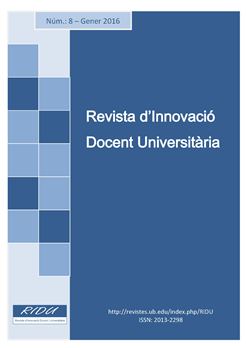APLICA_MATES: An on-line learning community
DOI:
https://doi.org/10.1344/RIDU2016.8.4Keywords:
Social Networks, On-line Learning, EvaluationAbstract
This paper presents the experience in creating APLICA-MATES, an on-line learning community created by the educative innovation group GIEMATIC at the Universidad Politécnica de Madrid. Its creation is part of a strategy to incorporate technology in the learning and evaluation processes. It is a closed community of teachers and students that aims to integrate the first year students, as well in socially and academically. This is done by means of collaborative learning, and sharing resources and general news on mathematics.References
[1] Borrás, O. (2013) Aplicación de las RRSS a la enseñanza (MOOC). Disponible en: https://plus.google.com/communities/110109268598525419924 [Consultado el 14 de julio de 2015].
[2] Casaravilla, A., del Campo, J.M., García, A., Torralba, M.R. (2012) Análisis del Abandono en Estudios de Ingeniería y Arquitectura en la Universidad Politécnica de Madrid. En Arriaga, J. (Ed.), IICLABES. Segunda Conferencia Latinoamericana sobre el abandono en Educación Superior (pp. 61-72). Porto Alegre (Brasil). Disponible en: http://www.clabes2012-alfaguia.org.pa/docs/LibroActas_II-CLABES.pdf [Consultado el 14 de julio de 2015].
[3] Espuny, C., González, J., Lleixà, M., Gisbert, M. (2011) Actitudes y expectativas del uso educativo de las redes sociales en los alumnos universitarios. En El impacto de las redes sociales en la enseñanza y el aprendizaje. Revista de Universidad y Sociedad del Conocimiento (RUSC), 8(1), pp. 171-185.
[4] Fidalgo, A., Sein-Echaluce, M.L., Borrás, O., García, F.J. (2015) Educación en abierto: Integración de un MOOC con una asignatura académica. Disponible en: http://www.researchgate.net/publication/276352772
[5] García, A. (Ed.) (1994) Prácticas de Matemáticas con Derive. Clagsa, Madrid (o Mathematisches Praktikum mit DERIVE, Addison-Wesley, 1995).
[6] García, A., Martínez, A., Miñano, R. (1995) Nuevas Tecnologías y Enseñanza de las Matemáticas. Síntesis, Madrid.
[7] García, A., García, F., Miñano, R., Ruiz, B. (2009) Adaptación de una asignatura de Análisis Matemático al EEES. En III Jornadas Internacionales UPM sobre innovación Educativa y Convergencia Europea (INECE’ 09). Madrid.
[8] García, A., Pinero, R., Ramírez, P. (2013) Online Course on the History of Algorithms. IEEE Journal of Latin-American Learning Technologies, 8(1), pp. 2-6.
[9] García, A., García, F., Martín, A., Rodríguez, G., de la Villa, A. (2014) Changing assessment methods: New rules, new roles. Journal of Symbolic Computation, 61, pp. 70-84.
[10] Gikandi, J.W., Morrow, D., Davis, N.E. (2011) Online formative assessment in higher education: A review of the literature. Computers and Education, 57(4), pp. 2333-2351.
[11] Levis, D. (2011) Educational Networks 2.1. Social media, collaborative environments and teaching-learning processes. En El impacto de las redes sociales en la enseñanza y el aprendizaje. Revista de Universidad y Sociedad del Conocimiento (RUSC), 8(1), pp. 7-24.
[12] Muñoz, M.M., Fragueiro, M.S., Ayuso, M.J. (2013) La importancia de las redes sociales en el ámbito educativo. Escuela Abierta, 16, pp. 91-104.
Downloads
Published
Issue
Section
License
Authors whishing to publish in this journal agree to the following conditions:
- The author or author retain copyright and grants the journal the right of first publication of the paper.
- The texts will be published under license "Reconocimiento Creative Commons 4.0 España", which allows to share, distribute, reproduce and the public communication of the paper, as long as the name of the author or authors and the journal are clearly stated.







